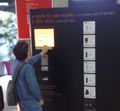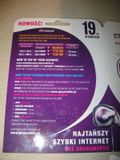 I had an interesting surprise when I passed through Paris airport recently. Orange (France Telecom) has put a vending machine in the airport hall where people can buy prepaid SIM cards with different kind of phones and also prepaid 3G Internet access together with a 3G stick.
I had an interesting surprise when I passed through Paris airport recently. Orange (France Telecom) has put a vending machine in the airport hall where people can buy prepaid SIM cards with different kind of phones and also prepaid 3G Internet access together with a 3G stick.
The Internet offer with the 3G stick (locked to the network operator I suppose) is around 30 Euros. Oddly enough from an outsiders view, usage is paid by time and not by volume. 2h are included in the starter pack.
Unfortunately, prices for further online time are very unattractive. 3 euros buy 20 minute of online access, an hour costs 8 euros and 6 hours cost 25 euros. Online activities can be interrupted and all but the smallest pass are valid for using during a timeframe of one month. Compare that to the 1GB for 15 euros offer which is valid for a year from A1 in Austria. Quite a difference.

